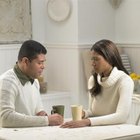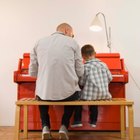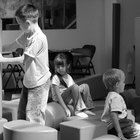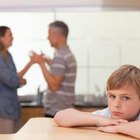
altrendo images/Stockbyte/Getty Images
Infidelity affects the entire family, immediate and extended, according to licensed social worker and psychologist Allan Schwartz in an article titled “The Impact of Divorce on Families on the MentalHelp.net site. More research has been conducted on the impact that infidelity has on the immediate family than how it affects the extended family, writes Schwartz. However, if the couple has children together and each spouse developed relationships with extended family, the damage will impact extended family.
Children’s Emotional Response
When children discover that Mom or Dad has been unfaithful, they may feel insecure in the relationship and suffer a loss of trust in the cheating partner, according to psychologist Ana L. Nogales, specializing in marriage and relationship therapy and Latina issues. This is true even if you don't tell the kids that a parent is cheating, because they feel the tension that exists between you. If one of you walks out of the relationship, your children may feel responsible for the split, regardless of how often you tell them that the responsibility lies with the parents. Older children who understand the meaning of infidelity may experience anger, shame, confusion and resentment, according to Nogales.
Parents as Role Models
Parents are supposed to provide appropriate role models to children, but cheating isn't a something you want to teach your kids. Many adult children whose parents were unfaithful repeated the cycle, according to Nogales’ survey of more than 800 adult children of cheaters. More than 80 percent of the respondents said their attitudes toward love and relationships were affected, and 83 percent said they believed that everyone lies. Additionally, more than 70 percent of the respondents indicated that their ability to trust was affected. Many parents who had conducted an affair probably never considered those repercussions.
Telling the Kids (or Not)
Determining when and how to tell the kids isn’t an easy decision, according to psychiatrist and relationship researcher Scott Haltzman M.D. in a “Psychology Today” article titled “Should the Children Know You've Had an Affair?” You shouldn’t tell your kids if they will become a tool to get back at your cheating spouse. Tell the kids primarily if they will discover the information from family or friends or if the marriage is ending and your kids are old enough to understand the circumstances, counsels Hatlzman, If the kids are too young to comprehend the information or if the affair over and you commit to rebuild the marriage, telling the kids is probably not a good idea. You might simply explain that you are having problems, but you are committed to staying together and working through them.
Extended Family
If you both have developed loving and caring relationships with your in-laws, they may feel strong emotions when the infidelity is uncovered. Extended family might take sides against the cheating spouse or become embroiled in the relationship. If the marriage crumbles, extended family may grieve the loss of the son- or daughter-in-law. Family gatherings that included the divorced spouse could become strained if family members blame the cheating spouse for the relationship demise and damage to the children and faithful spouse.
Related Articles

Traumatic Effects of a Bad Marriage on ...

How to Deal With a Spouse Who Is ...

The Negative Effects of Extramarital ...

The Emotional Effects on the Father ...

Emotional Effects of Unresolved Issues ...

The Effects of Separation & Divorce on ...

Psychological Effects of Fatherlessness

How Do I Tell My Family My Partner ...

How Children Are Affected When Living ...

How to Leave Your Husband

Marriage Problems for Adult Children of ...

The Boundaries of a New Relationship ...

How to Handle Brothers & Sisters Who ...

The Effects of Poor Communication

The Advantages & Disadvantages of a ...

How Does a Controlling Spouse Affect a ...

Importance of Family Structure in ...

Advantages of a Blended Family

What Makes a Good Husband & Father?

What Effects Can Stress Have on a ...
References
Writer Bio
Rev. Kathryn Rateliff Barr has taught birth, parenting, vaccinations and alternative medicine classes since 1994. She is a pastoral family counselor and has parented birth, step, adopted and foster children. She holds bachelor's degrees in English and history from Centenary College of Louisiana. Studies include midwifery, naturopathy and other alternative therapies.
Photo Credits
altrendo images/Stockbyte/Getty Images